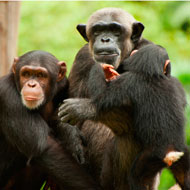Dramatic variations seen in chimp communities

Researchers believe that some of the differences may be down to the impact of human presence.
Chimpanzee societies show dramatic differences in hunting practices, food sharing and social status, according to a 27-year study of two communities in Uganda.
A research team led by the University of St Andrews studied two neighbouring chimp communities in the Budongo Forest, Uganda. Despite living in the same forest, with access to the same prey, scientists observed them hunting for different species and sharing food differently.
Findings published in PLOS ONE show that the Sonso community, which researchers studied for 27 years, prefers to hunt for black and white colobus monkeys. Once the money is caught, high-ranking males take possession of the carcass - even if they did not catch it - and the rest of the group beg for access to the food, which is sometimes shared.
However, the Waibira community, observed for six years, prefers to hunt for duiker - a type of small antelope - which Sonso chimps have never been seen to hunt.
After prey is caught, lower-ranking members of the Waibira community - even young females - are able to take possession of the carcass.
Some differences between the two groups, such as the hunting of red duiker, may simply reflect a preference for different types of food, but other differences may be down to a variation in social behaviour.
Lead author Dr Catherine Hobaiter commented: “One of the most remarkable differences we see is in how the groups share meat. In Sonso it is rank-based - the most dominant chimp gets the meat, even if he wasn’t the one that caught it. In Waibira we sometimes see younger individuals, even young females, keep the whole carcass and even if it’s the alpha male who arrives, she’ll refuse to share it.”
Researchers believe that some of the differences may be down to the impact of human presence. The types of prey hunted in Waibira now are similar to those recorded in the early years of research in the Sonso community. Regular colobus hunting in Sonso only emerged after around 15 years of research. A similar pattern has been seen at other long-term sites where chimps switched to colobus hunting after many years of being observed by humans.
Dr Hobaiter said that while long-term research with wild chimps can bring real conservation benefits, “but we have to remember that our presence can affect their behaviour”.



 The Veterinary Medicines Directorate (VMD) is inviting applications from veterinary students to attend a one-week extramural studies (EMS) placement in July 2026.
The Veterinary Medicines Directorate (VMD) is inviting applications from veterinary students to attend a one-week extramural studies (EMS) placement in July 2026.